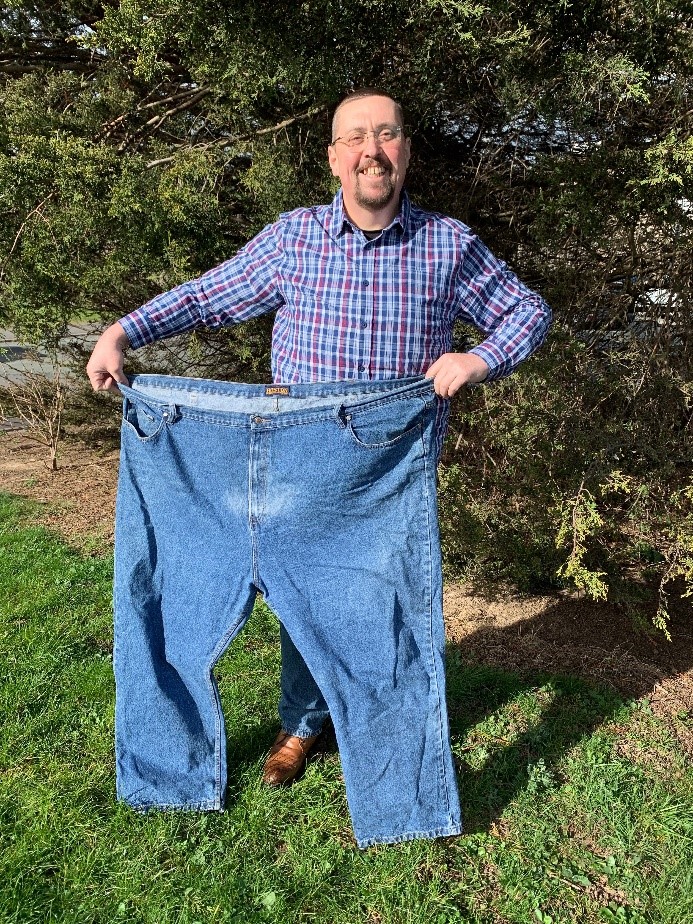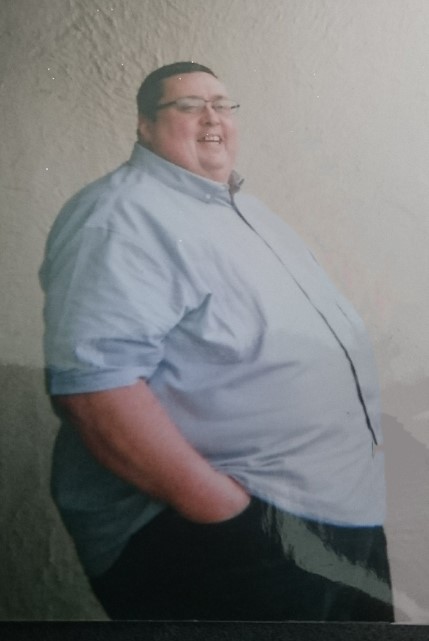News from our partners: Jason thanks Bariatric team after shedding 23 stone
News from our partners Shrewsbury and Telford Hospital NHS Trust (SaTH)
A Telford man has thanked staff at the Royal Shrewsbury Hospital (RSH) for saving his life after he lost over half his body weight with the help of the Bariatric team.
Jason Parrish, 45, had struggled with his weight from an early age, and by the time he was 40 he tipped the scales at 40 stone. After being referred by his GP to the Bariatric Service at RSH, he dieted and undertook extensive health education before having a gastric balloon inserted, followed by a sleeve gastrectomy.
In the space of two years Jason has overcome a catalogue of health issues and lost a staggering 23 stone to reach his target weight of 17 stone.
Bariatric surgery covers a number of procedures used to help people who are very obese to achieve and maintain long term weight loss. It is offered to patients, following a referral from their GP, who have a Body Mass Index (BMI) over 40 or a BMI over 35 with weight related health problems such as Type 2 Diabetes, sleep apnoea, high blood pressure and hip and knee arthritis. Many of them have spent a lifetime dieting without success.
The Shrewsbury and Telford Hospital NHS Trust (SaTH), which runs RSH and the Princess Royal Hospital (PRH) in Telford, is an advocate of exercise and healthy eating, but for some people who reach a certain weight this is no longer enough.
Sister Bryony Price, Senior Bariatric Nurse at SaTH, said:
“We often joke to one another that we’re addicted to chocolate or that we can’t live without cheese, but an addiction to eating is very real.
“Everywhere we go we are offered extra shots in our latte, there are supersize meals on menus, biscuits with 20% extra free, and shops selling meal deals that encourage us to eat more. It is so easy for people in today’s environment to get fat.
“It’s understandable to think that people should be able to exercise self-control, but if you consider morbid obesity as an illness, we are now dealing with an epidemic that has taken hold over the last 30 years and, unlike some other habits, we can’t distance ourselves from it to break the cycle. We are surrounded by food and food messaging every single day.”
Some feel that Bariatric surgery is expensive and wastes time and money when the NHS could be helping patients with other illnesses, but Sister Price explains that it can save the health economy money in the long-run:
“Our hospitals are full of patients with Type 2 Diabetes, and currently 90% of these patients are overweight or obese.
“It is estimated that the NHS spends £22,000 every minute treating diabetes, so the cost of bariatric surgery can be offset within three years as patients no longer need expensive diabetic medications.”
Approximately 180 obese people are having safe and effective weight loss surgery at RSH every year, and the team’s relationship with the patients doesn’t end once surgery is over. At SaTH a big emphasis is placed on high quality aftercare that helps patients through the important first few years after the operation, when the effects of surgery plateau and they need to maintain their own weight loss.
Mr Manel Riera, Consultant Bariatric Surgeon, said:
“Bariatric surgery is a safe, cost-effective therapy for obesity, a deadly disease. Over 30% of people in the West Midlands are obese, with many of them morbidly obese and suffering from diabetes, sleep apnoea syndrome and a host of other medical problems. While significant resources are spent on prevention of obesity, patients with morbid obesity and other diseases will benefit from the support of our specialist team.
“The Bariatric unit here in Shropshire provides a holistic approach, based on the individual needs of our patients. The guidance provided throughout their long journey, both before and after the surgery, will help them achieve long term maintained weight loss and very significant health benefits.”
Sister Price and her team run a patient support group that meets bi-monthly in the evenings at PRH and RSH. Patients thinking about surgery and those who have been through surgery meet to share experiences, listen to speakers and swap tips on how to make the process a success. The group is also an invaluable source of support so that patients can see that they are not on their own.
For more information about the Patient Support Groups contact Sister Price via email: bryony.price@nhs.net



